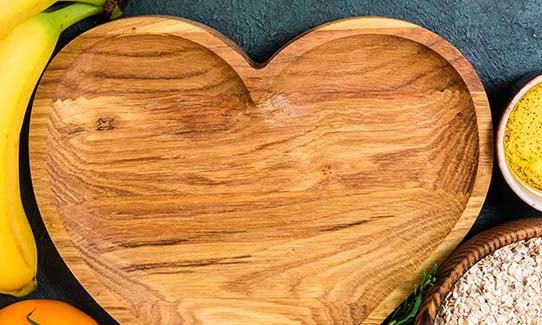

Feb 13 2023
Eat Smart for a Happy Heart


Summary
To lower your risk of heart disease and strengthen your heart, what you eat matters.
Heart disease is the No. 1 killer in America and contributes to disability for many who suffer from it.
This includes high blood pressure and high cholesterol, both of which increase your risk for heart attack and stroke. To lower your risk of heart disease and strengthen your heart, what you eat matters.
Heart-Smart Eating
- Enjoy more whole foods such as vegetables, fruits, nuts, seeds and whole grains.
- Choose lean sources of protein such as skinless poultry (chicken and turkey), fatty fish high in omega-3 fatty acids such as salmon, sardines and albacore tuna, as well as other seafood. These proteins should be baked, boiled or grilled rather than fried or smothered in creamy sauces.
- Increase the color in your diet with fruits and veggies and aim for at least five servings per day for more heart healthy fiber and nutrients.
- Limit processed foods that are high in sugar and unhealthy fats that increase your risk of heart disease. Cook with olive or avocado oil instead of butter.
- Limit excess sodium, which can lead to high blood pressure. About 70% of sodium consumed daily comes from packaged foods, including canned or pickled foods, frozen meals, fast food or restaurant meals. Choose foods that are “low sodium” or “reduced salt. Read food labels for sodium content: 140 mg of sodium or less per serving is considered low, while 400 mg or more of sodium per serving is considered high. Remember, salt does not always taste salty and hides easily in instant pudding, instant oatmeal, quick breads/mixes, packaged mixes, frozen dinners/pizza, pickled foods, cured meats, ramen noodle mixes and condiments.
Change for Good
Start by making one change at a time so the changes become a part of your lifestyle. Try swapping out foods high in saturated fat or sodium for ones lower in saturated fat and sodium. Incorporate more fruits and veggies.
Heart Healthy Swaps
- Olive or avocado oil instead of butter or vegetable oils
- Salt-free seasonings, lemon or vinegar instead of salt
- Vinegar-based dressings (vinaigrette) instead of salad dressings
- Broth-based soups and sauces instead of creamy soups and sauces
- Grilled, baked, boiled or steamed foods instead of fried foods
- Wheat bread instead of white bread
- English muffin instead of biscuit or bagel
- Air-popped popcorn or pretzels instead of chips
- Whole fruit instead of fruit juices
- Low fat dairy (milk, yogurt, cheeses) instead of whole fat dairy
- Water or sugar-free beverages instead of sugary beverages (soda, tea, coffee)


Emily Littlejohn, MS, RD, LD
Emily Littlejohn, MS, RD, LD, is a registered dietitian with NMMC’s Population Health Department. Emily holds bachelor’s and master’s degrees in food and nutrition services from the University of Mississippi. She offers nutrition counseling by appointment at the NMMC Wellness Center in Tupelo. Call (662) 377-7803 for more information.
Nutrition plays a key role in health, healing and living a well-balanced life. Whether you need support for special dietary concerns or simply want to eat more healthfully, we can help.
Call (662) 377-7803 to request nutrition counseling.

Subscribe to Our Newsletter
Like this content and want to get more? Sign up for True North, the health and wellness newsletter from North Mississippi Health Services!

Subscribe to Our Newsletter
Like this content and want to get more? Sign up for True North, the health and wellness newsletter from North Mississippi Health Services!

Nurse Link®
Call 1-800-882-6274 anytime to speak directly to a registered nurse and get immediate answers. Using computerized medical protocols, nurses direct callers to the most appropriate medical treatment. Our nurses are available 24 hours per day, seven days per week.